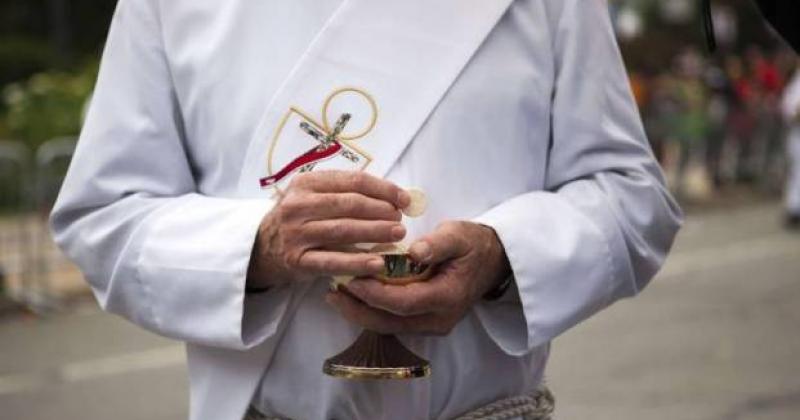Opinion is split, with some believing that doctrine cannot be changed as it would confuse faithful and others emphasising that the Church is supposed to accompany everyone. One of the Synod Fathers tells the story of a little boy who broke the host in two and gave half to his father, a remarried divorcee
The Synod on the Family is pressing on in the Vatican (4-25 October 2015) and today participants went right to the heart of the question about the possibility of admitting remarried divorcees to the sacrament of communion. This is one of Synod’s thorniest topics and was also addressed at last year’s Extraordinary Synod, with a long series of speeches covering a wide spectrum of views.
“Although it is not the only issue being discussed, it has to be admitted that the issue of whether remarried divorcees should be granted access to communion, has been present in a large chunk of the numerous speeches given in the past 24 hours.” The point was highlighted by Romilda Ferrato, one of Vatican spokesman Fr. Federico Lombardi’s French language assistant.
Ninety three speeches were given during the general discussions that took place in the Synod Hall between yesterday afternoon and this morning. The debate marks the third and final phase of the Synod discussions on working document (the Instrumentum laboris), which should conclude this afternoon, before the 13 language-based discussion groups (circuli minores) take the floor once again, to produce their final batch of reports before the conclusion of the assembly. The subject is especially interesting “in that it captures, more than any other issue, the essence of the approaches proposed in this assembly, like last year: there are those who underline that the role of the Church is not to be swayed by public or political opinion but to be faithful to the Lord, others say that the Church should be by people’s side despite their failures but without betraying doctrine and those who urge caution against the adoption of hasty solutions that risk generating confusion and unsettling faithful. In between these two approaches, many point out that no one is aiming at giving indiscriminate access to communion but to propose a personalised approach to the conduct of faithful, guided by diocesan bishops. There is such a variety of in-between stances that one of the speakers spoke of a tonality spectrum that ranged from 0 to 100.”
Bernd Hagenkord, Fr. Lombardi’s German language assistant, underlined that many of the Fathers “spoke in defence of and for a clarification of the Catholic doctrine on marriage and the family, saying that the Christian vision of marriage needs to be more clear-cut, with an emphasis on the fact that the Church does not have the authority or the power to alter the word of God. Others have underlined that as a follower of Jesus’ teaching, it cannot permanently exclude certain faithful from the sacraments because we are not border control officers who check Christians’ purity.” Hagenkord summed up by stating that “many, many speeches” were given and they were all “constructive and of a high quality”.
Fr. Manuel Dorantes, the Spanish-speaking language assistant, recounted the powerful story told by one Synod Father about a very unusual first communion. When a young boy went up to the altar to receive the host, he spontaneously broke it in half and gave half to his father, who was a remarried divorcee and could therefore not receive it directly.
Regarding the penitential path, a project presented by Cardinal Walter Kasper a year and a half ago, as a condition for accessing communion, Mgr. Carlos Aguiar Retes, Archbishop of Tlalnepantla (Mexico), who spoke during the briefing, recalled that it is a path that is similar to the one offered in the Orthodox Churches, which involves repentance as a condition for mistakes being accepted and a new path taken.” Stanislaw Gadecki, Archbishop of Poznan and President of the Polish Bishops’ Conference, stressed that the Polish Episcopate “excluded” communion as a possibility, referring to the Familiaris consortio of 1984, underlining that remarried divorcees “are not excommunicated, but there are a numerous different ways to participate in Church life,” while recognising that sometimes “those who are excluded from communion have a stronger yearning for the Eucharist than those who have regular access to it.” More in general, the Mexican bishop recalled that it is not and has never been the Synod’s intention to take decisions that are the Holy Father’s to take. We communicate our reflections and points of view to him.”
Many issues, aside from the remarried divorcee question, were addressed in the various speeches delivered. Fr. Thomas Rosica, Fr. Lombardi’s English-language assistant talked about the differences between all the various cultures, the formation of priests with difficult family backgrounds, social questions such as immigration and prostitution. He also referred back to what one of the Synod Fathers said, “speaking about the importance of smiling, given that Pope Francis demonstrates how important it is for priests to smile”. Fr. Lombardi added that someone “talked about the Motu Proprio on the marriage annulment process, particularly with regard to the training of legal professionals”. Many proposals were put forward and some very concrete pastoral advice was given. One of the Synod Fathers “underlined that the Instrumentum laboris only mentions forgiveness once, and that is not much”.
